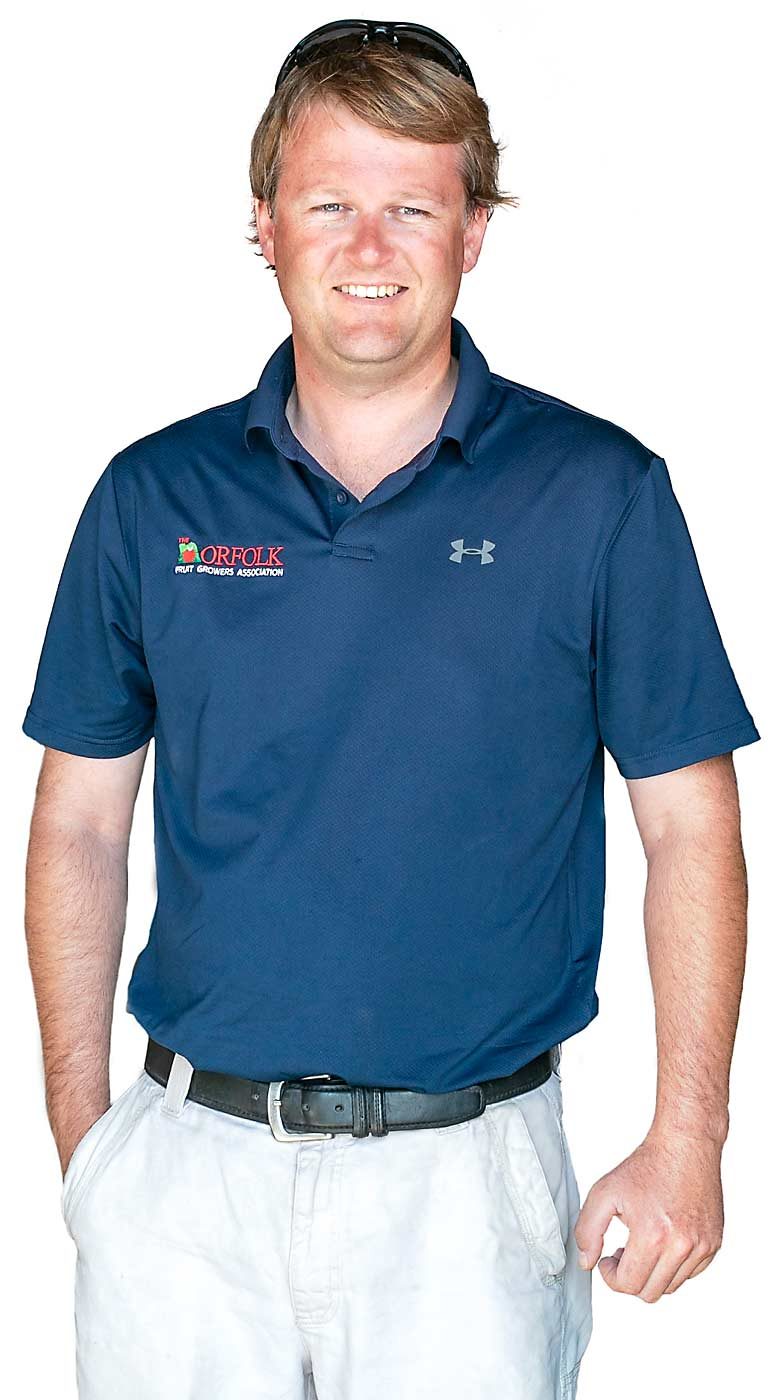family background / Hayden grew up on a family farm in Hawkes Bay, New Zealand. After traveling for work, he settled down in Simcoe, working for Norfolk Fruit Growers Association and buying his first orchard with his wife, Amanda.
age / 35
crops / Apples
business / Norfolk Fruit Growers Association
How did you get your start?
Growing up on the central, East Coast of New Zealand, I looked at going into the apple industry when I was coming out of school.
I really enjoyed the work and life experiences and horticulture skills I gained while working in the apple orchard on the family farm.
At the time, I was reluctant to go into it because of the prices in the export markets. I wasn’t sure if I wanted to join the apple industry in any significant way, shape or form.
How did you end up in Canada?
When I was coming out of school, I studied grape and wine production and I found an opportunity that took me on an overseas adventure and expanded my capabilities.
I wanted to get some experience someplace other than New Zealand and learn about the agriculture industry. That path led me to the United Kingdom and back to the apple industry.
I’ve worked in the apple industry since. While there, I had an opportunity to come to work in Canada for three months in 2005, and now I own an apple orchard with my wife.
What challenges do you work with in Canada?
A big thing to look at when getting into a farming operation in Canada is how chemical regulations are handled.
When we were looking into buying an orchard, there were regulation changes to a few chemicals that are very important to the apple industry.
At that time, I wrote a letter on behalf of the farm, as well as Norfolk Fruit Growers Association, to make sure we clearly expressed our concerns about those regulations. We were looking at a threat to the business in the long term. It’s scary dealing with those kind of circumstances as a farmer.
We were looking at a threat to the business in the long term. It’s scary dealing with those kind of circumstances as a farmer.
What has helped you plan for the future?
I’ve committed a lot of time learning about what is necessary for the farm. An example is banking; understanding the financial end is a key part of a horticultural business.
It’s daunting to explain to a banker that you want to purchase an orchard, you’ll need a loan for the property and an operating line to run the farm. In my experience, the process of obtaining financing sometimes comes down to finding the right banker.
It’s been key to our success so far and it will be important to Amanda and I moving forward.
What was the process for purchasing your farm?
It was an opportunity purchase because we were approached by the land owner. Even though the process moved pretty quickly, it came down to starting with a cost analysis.
The question, ‘Can I actually afford this?’ needed to be answered. Before you even talk about banking, getting a loan for purchase and operations, you need to know what the business looks like on a piece of paper.
Here are a few of my experiences after working with other farmers on that process: Are there areas where the purchase may go wrong? We have a production insurance program on our farm where it protects against frost and hail. It’s a significant cost to our operation.
Getting specific information about what’s covered and the actual costs for your farm can be difficult. Getting production costs from neighboring farms has helped ensure we’re going in the right direction.
Another thing that helped was the opportunity to work in the orchard before we owned it.
What advice do you have for other young growers?
Getting into this property, we’ve taken on some significant financial risk. I’m not a risk-averse person, having moved away from a permanent job, going overseas to chase aspirations.
Taking on this burden is something I try not to let keep me up at night, and I think that perspective is important. Farmers can worry themselves too much about the financial burden to be successful in agriculture.
I think it’s really important to enjoy what you’re doing at work. Also, find things you can enjoy outside of the farm to help remove that stress. Look at your capabilities.
Don’t be afraid to use other people’s capabilities if you see someone has strengths where you have weaknesses. When you take a leap of faith, fully understand the risks associated with buying an apple orchard.
This season will be my first apple crop as an owner and I’ll be hugely excited to see it come off the trees, be put into bins and be delivered to the storages. For me, I need to follow it through to the end.
—by TJ Mullinax







Leave A Comment